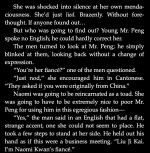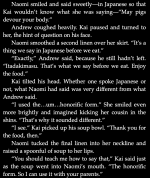joy_of_cooking
Literotica Guru
- Joined
- Aug 3, 2019
- Posts
- 1,310
Has anyone written a story in which people speak another language, and their other-language dialogue is quoted in English?
I'm writing a story where the MMC does not speak English fluently and is experiencing a sort of culture shock upon moving to a place where nearly everyone is a monolingual English speaker. I want the reader to be very aware of the language barrier between the MMC and his new neighbors. It's a big part of his loneliness, and a big part of what draws him to the FMC (who can understand Mandarin).
But this leaves me in the odd position of writing a story where everything is told to the reader in English, but actually a lot of dialogue is not in English. This is way beyond the occasional profanity or proverb, where I can quote the original Chinese and then discreetly repeat the sentence in English as a translation. They have entire conversations in Mandarin, or sometimes mixed conversations where he's speaking to her in Mandarin and she's replying in English. Or scenes where he and his daughter use quick bursts of Chinese as a back channel in front of monolingual English speakers.
Stuff I'm trying:
Any other ideas? Tips, tricks, experiences?
I'm writing a story where the MMC does not speak English fluently and is experiencing a sort of culture shock upon moving to a place where nearly everyone is a monolingual English speaker. I want the reader to be very aware of the language barrier between the MMC and his new neighbors. It's a big part of his loneliness, and a big part of what draws him to the FMC (who can understand Mandarin).
But this leaves me in the odd position of writing a story where everything is told to the reader in English, but actually a lot of dialogue is not in English. This is way beyond the occasional profanity or proverb, where I can quote the original Chinese and then discreetly repeat the sentence in English as a translation. They have entire conversations in Mandarin, or sometimes mixed conversations where he's speaking to her in Mandarin and she's replying in English. Or scenes where he and his daughter use quick bursts of Chinese as a back channel in front of monolingual English speakers.
Stuff I'm trying:
- Outright saying "Switching to English," "said in Mandarin," etc.
- Making his English quite broken, and his Mandarin (quoted as English text) much more correct, nuanced, and complex.
- Sometimes having him point or circumlocute or use words that are correct in denotation but inappropriate in connotation.
Any other ideas? Tips, tricks, experiences?

